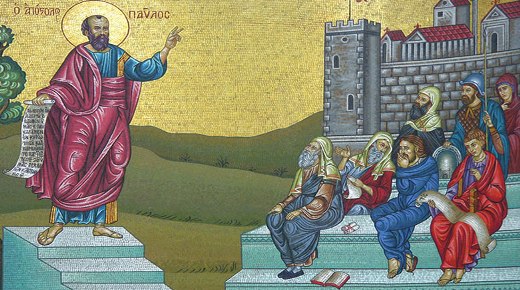
Antioch of Pisidia, which is located on the western plateau of the Taurus Mountains, had the honor of being the first place in all of Asia Minor to hear the preaching of St. Paul (noted by St. Luke in Acts 13:16-41). With this, the Church of Antioch was founded, and from there the Gospel of Christ spread to the wider region. While we can feel grateful to the Great Apostle for this saving work, the Jewish leaders of the Antiochian Synagogue at that time were not. They were greatly alarmed when they saw the Christian population of the city and surrounding villages grow. These zealots appealed to the authorities, who then harassed and expelled Sts. Paul and Barnabas from the Province. Their troubles did not end there, for the Saints were also persecuted in Iconium and Lystra. In fact, it was in Lystra that St. Paul was stoned to the point where his enemies left him for dead (see Acts 14:19). He miraculously survived, but the persecution and sorrows never left him. In his Second Epistle to the Corinthians, he lays out the suffering he has endured for the Gospel: Illness, hunger, thirst, cold from lack of clothes and shelter, exhaustion from his travels with the constant threat of robbery, shipwreck (on his way to Rome), being beaten with sticks and stones, and 4 years of imprisonment. There is also the “thorn in the flesh, a messenger of Satan” that the Saint struggled with constantly (see 2 Corinthians 11:23-33; 12:7).
We can admire St. Paul’s great character, who in spite of all the hardships, engaged in missionary work that spread East and West. But how did this supreme Apostle deal with such grief? One would expect that all of this pain and difficulty would lead St. Paul to great unhappiness and despair. In such a state, he would be a pitiful figure, complaining to God: Lord, what have I done to You to deserve so much torment? I work for You, to teach people to believe in You! Why did You let me come to this? When people see me this way as a result of my faith in You, they will stay far away to avoid the same fate! But as we know, none of this was felt in the Saint’s soul. On the contrary, "I rejoice in my sufferings," as he writes to the Colossians (Colossians 1:24). To the Corinthians he writes: "When I am weak, then I am strong" (2 Corinthians 12:10). This does not conform to human logic and seems strange, but St. Paul aimed higher. Like athletes who work hard to win gold at the Olympics by constant training, exercise, self-deprivation, and pain; so too did St. Paul work towards a greater purpose in his life, that he moves “toward the goal for the prize of the upward call of God in Christ Jesus” (Philippians 3:14). He believed that no matter how much a Christian may suffer in this short life, it is nothing compared to the eternal glory that God has in store for us in the heavenly life to come (see Romans 8:18). This is why there was no hesitation when he said to the newly illumined Christians of Antioch of Pisidia: “we must through many tribulations enter the kingdom of God" (Acts 14:22). St. Paul did not tell people whatever they wanted to hear in order to appeal to them, as the false teachers did (see 2 Timothy 4:3). He was not afraid of people leaving the Church when they heard how hard it is, because he remembered what Jesus Himself had said: "narrow is the gate, and difficult is the way which leads to life" (Matthew 7:14). And the Lord encourages us to "strive to enter through the narrow gate" (Luke 13:24).
My brothers and sisters, let us keep in our minds and hearts the important lesson that the Holy Apostle teaches us today with his word and example. There will always be troubles in our lives. After all, the Lord has told us, "In the world you will have tribulations” (John 16:33). St. Paisios the Athonite said that, “my illnesses benefited me more than all the fasts, vigils and exercises of ascetic life.” We are not alone in facing these afflictions, because Christ is always there, giving us strength. We have God’s Word that assures us that we will not be tempted beyond our ability (see 1 Corinthians 10:13). May we never give up, but rather face everything with courage, patience, optimism, and a fighting spirit, as St. Paul did. In doing so, we can truly say at the end of our lives: “I have fought the good fight...Finally, there is laid up for me the crown of righteousness, which the Lord...will give to me on that Day (2 Timothy 4:7-8). Amen.





